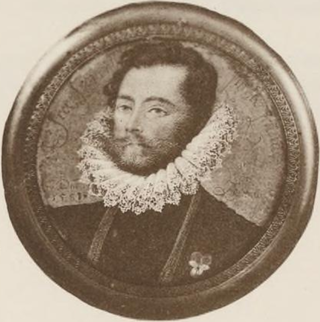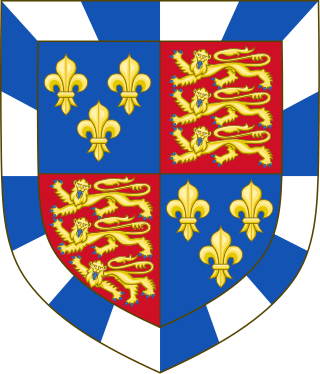Philip Cary (died 1437) was an English landowner and politician from Devon. [1]
Contents

Philip Cary (died 1437) was an English landowner and politician from Devon. [1]

Born about 1400, he was the son and heir of Sir Robert Cary (died about 1431), of Cockington in Devon, [2] and his first wife Margaret Courtenay, daughter of Sir Philip Courtenay (died 1406), of Powderham in Devon, and his wife Anne Wake (died 1390). His paternal grandparents were Sir John Cary (died 1395), of St Giles on the Heath in Devon, and his wife Margaret Holway. [1]
After the lands of his grandfather had been seized by King Richard II, his father had managed to regain Cockington, which passed to him about 1431. Two-thirds he had to put in the hands of trustees for settlement of debts while one-third was reserved for his stepmother Joan, [2] who outlived him. In 1433 he was elected Member of Parliament for Devon. [1] On 1 May 1434 he was on a commission with Bishop Edmund Lacey and Sir Roger Champernowne to receive the oaths of six knights and 68 others for the keeping of the peace in Devon. He died on 23 September 1437, only five weeks after the birth of his heir. [2]

About 1422 he married Christian Orchard (died 1472), daughter of William Orchard (died 1419), of Orchard in Somerset, and they had one son: William Cary, his heir, [2] who married first Elizabeth Paulet and secondly Alice Fulford. [1] Some sources also mention a daughter, Christian Cary, who married Richard Weekes (died 1483), of Honeychurch in Devon. [4] After his death, his widow married Walter Portman, [1] son of William Portman.

The Cary family is an English aristocratic family with a branch in Ireland. The earliest known ancestor of the family is Sir Adam de Kari who was living in 1198. Sir John Cary purchased the Manor of Clovelly in the 14th century and established the family's status as members of the landed gentry. Various branches of the family were ennobled in the late 16th and early 17th centuries as Baron Hunsdon and Viscount Falkland.
Boconnoc is a civil parish in Cornwall, England, United Kingdom, approximately four miles (6 km) east of the town of Lostwithiel. According to the 2011 census the parish had a population of 96.

Sir Hugh de Courtenay, 2nd/10th Earl of Devon, 2nd Baron Courtenay, feudal baron of Okehampton and feudal baron of Plympton, played an important role in the Hundred Years War in the service of King Edward III. His chief seats were Tiverton Castle and Okehampton Castle in Devon. The ordinal number given to the early Courtenay Earls of Devon depends on whether the earldom is deemed a new creation by the letters patent granted 22 February 1334/5 or whether it is deemed a restitution of the old dignity of the de Redvers family. Authorities differ in their opinions, and thus alternative ordinal numbers exist, given here.
MargaretSpencer (1472–1536) was the daughter of Sir Robert Spencer, of Spencer Combe in the parish of Crediton, Devon, by his wife Lady Eleanor Beaufort, the daughter of Edmund Beaufort, 2nd Duke of Somerset and Lady Eleanor Beauchamp.

Sir John Cary (or Carey) (c. 1491 – 1552), of Pleshey in Essex, was a courtier to King Henry VIII, whom he served as a Groom of the Privy Chamber, and of whom he was a third cousin, both being 4th in descent from John Beaufort, 1st Earl of Somerset (1371-1410).

Sir George Carey, JP, DL, of Cockington in the parish of Tor Mohun in Devon, England, was Lord Deputy of Ireland from May 1603 to February 1604.
Sir Hugh de Courtenay (1251–1292) was the son and heir of John de Courtenay, feudal baron of Okehampton, Devon, by Isabel de Vere, daughter of Hugh de Vere, 4th Earl of Oxford. His son inherited the earldom of Devon.

Lady Eleanor Beaufort was the daughter of Edmund Beaufort, 2nd Duke of Somerset (1406-1455), KG, and was a sister of the 3rd and 4th Dukes of Somerset.

Sir Philip Courtenay of Powderham, Devon, was the senior member of a junior branch of the powerful Courtenay family, Earls of Devon.

Sir Philip Courtenay, of Powderham, Devon was the fifth son of Hugh Courtenay, 10th Earl of Devon (1303–1377). He was the founder of the cadet dynasty known as "Courtenay of Powderham", seated at the manor of Powderham, until then a former Bohun manor of little importance, whilst the line descended from his elder brother, the Earls of Devon of the mediaeval era, continued to be seated at Tiverton Castle and Okehampton.

Sir William Courtenay of Powderham in Devon was a prominent member of the Devonshire gentry. He was Sheriff of Devon in 1579–80 and received the rare honour of having been three times elected MP for the prestigious county seat (Devon) in 1584, 1589 and 1601.

Robert Carey, lord of the manor of Clovelly in North Devon, was Member of Parliament for Barnstaple, Devon, in October 1553 and served as Sheriff of Devon in 1555–56. He served as Recorder of Barnstaple after 1560. Along with several other members of the Devonshire gentry then serving as magistrates he died of gaol fever at the Black Assize of Exeter 1587. His large monument survives in Clovelly Church.

The historic manor of Raleigh, near Barnstaple and in the parish of Pilton, North Devon, England, was the first recorded home in the 14th century of the influential Chichester family of Devon. It was recorded in the Doomsday Book of 1086 together with three other manors that lay within the later-created parish of Pilton. The manor lies above the River Yeo on the southern slope of the hill on top of which stand the ruins of the Anglo-Saxon hillfort called Roborough Castle. Part of the historic manor of Raleigh is now the site of the North Devon District Hospital.

Sir John Cary, of Devon, was a judge who rose to the position of Chief Baron of the Exchequer (1386–88) and served twice as Member of Parliament for Devon, on both occasions together with his brother, Sir William Cary, in 1363/64 and 1368/69.

Sir Robert Spencer "of Spencer Combe" in the parish of Crediton, Devon, was the husband of Eleanor Beaufort (1431–1501), the daughter of Edmund Beaufort, 2nd Duke of Somerset (1406–1455), KG, and was father to two daughters and co-heiresses who made notable marriages.

Sir Robert Cary of Cockington, Devon, was twelve times Member of Parliament for Devon, in 1407, 1410, 1411, May 1413, April 1414, Mar. 1416, 1417, 1419, May 1421, 1422, 1425 and 1426. Much of his later life was devoted to regaining the many estates and other landholdings forfeited to the crown following his father's attainder in 1388. He was an esquire in the households of King Richard II (1377–1399) and of the latter's half-brother John Holland, 1st Duke of Exeter.

Sir William Cary (1437–1471) of Cockington and Clovelly in Devon was a member of the Devonshire gentry. He was beheaded after the defeat of the Lancastrians at the Battle of Tewkesbury in 1471.
The Manor of Clovelly is a historic manor in North Devon, England. Within the manor are situated the manor house known as Clovelly Court, the parish church of All Saints, and the famous picturesque fishing village of Clovelly. The parish church is unusually well-filled with well-preserved monuments to the lords of the manor, of the families of Cary, Hamlyn, Fane, Manners and Asquith. In 2015 the Rous family, direct descendants via several female lines of Zachary Hamlyn (1677–1759) the only purchaser of Clovelly since the 14th century, still own the estate or former manor, amounting to about 2,000 acres, including Clovelly Court and the advowson of the parish church, and the village of Clovelly, run as a major tourist attraction with annual paying visitor numbers of about 200,000.
Trethurffe is an historic estate in the parish of Ladock, near Truro, in Cornwall.
Sir Robert Chalons was an English courtier, soldier, administrator and politician from Devon.